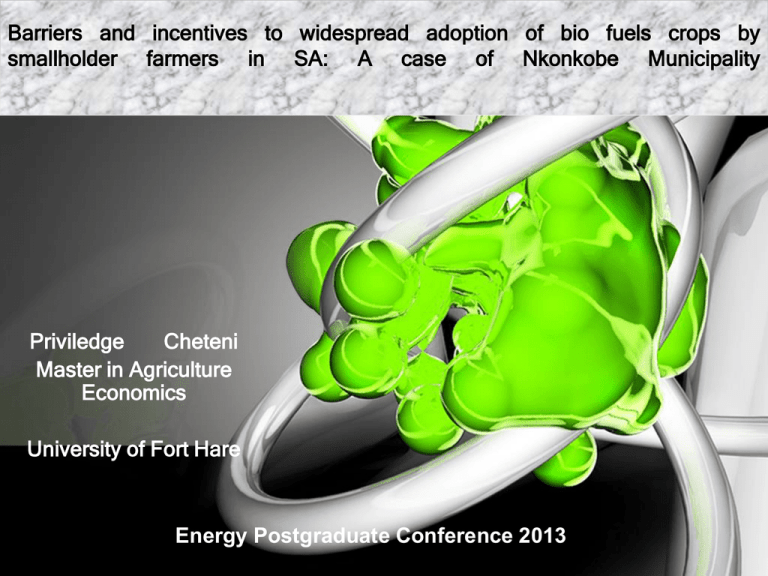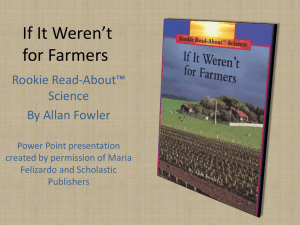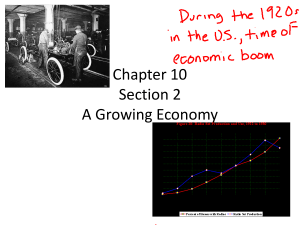Cheteni_P - Energy Postgraduate Conference
advertisement

Barriers and incentives to widespread adoption of bio fuels crops by smallholder farmers in SA: A case of Nkonkobe Municipality Priviledge Cheteni Master in Agriculture Economics University of Fort Hare Energy Postgraduate Conference 2013 Outline Introduction Problem Research questions and hypothesis Literature review Methodology Conclusion Introduction Subsistence farming is a backbone of agricultural production in SA. Subsistence agriculture accounts for about 3% of South African GDP and the broader agri industrial sector contributes about 12% of GDP (Nedbank,2012). Small scale farmers productivity reduced by structural changes and policies (Palmer & Ainsle, 2012) Lack of access of new agriculture technology identified as a factor (Von Braun, 2007). Improved agriculture technology stressed in key planning documents as a means of creating jobs, reducing inequality and increasing economic growth in rural disadvantage areas previous oppressed by apartheid (Integrated Development Programme, 2000). Problem Eastern Cape region is dry and not good for commercial crop farming (Musemwa et al, 2008) In Nkonkobe Municipality rainfall is uneven distributed ranging from 400 mm to 1200mm (Shackleton & Shackleton,2006) making the place not ideal for rain fed crops. Smallholder farmers face challenges like low productivity and access to markets. As a result, smallholder agriculture remains low in productivity (DBSA,2010) • Few small scale farmers have adopted biofuels for production (Funke et al,2007). This study would investigate factors influencing adoption of biofuels in Nkonkobe Municipality Objectives The main objective of the study is to identify factors affecting/influencing adoption of biofuel crops by small holder farmers in Nkonkobe Municipality. Other objectives To investigate if farmers are aware of bio fuels crops in Nkonkobe Municipality. To estimate determinants of farmers potential to adopt bio fuels crops in Nkonkobe. To develop a list of incentives that may motivate farmers to produce biofuels. Hypothesis Farmers are aware of biofuels crops in Nkonkobe Municipality. Social, economic and farming factors influence farmers to adopt biofuels crops. Monetary incentives access to market and government subsidies motivate farmers to adopt bio fuels crop Research Questions Are farmers aware of bio fuels crops? What are the determinants of farmers potential to adopt bio fuels crops? What incentives motivate farmers to produce biofuels crop. Literature Review Ajewole (2010) measuring the response to adoption of fertiliser used a tobit model. Uaine (2009) used a probit model to measure technology adoption in Mozambique. agriculture Stan and William (2003) employed the Heckman’s two-step procedure to analyze the factors affecting awareness and adoption of new agricultural technologies in USA. The first stage was the analysis of factors affecting the awareness of new agricultural technologies and the second stage is adoption of the new agricultural technologies Methodology The study will be done in Nkonkobe Municipality in these areas; Upper Ncera, Lower Ncera, Krwakrwa and Kayelitsha A stratified random sampling method will be used to select farmers into two groups Questionnaires will be used to gather data. Primary and secondary data that would be collected includes social economic factors such age, education , name etc, farm specific such as number crops grown, Economic such as income ,farm investments. Description of respondent type Number to be sampled Small-scale farmers utilising 59 land Small Scale farmers not utilising land 59 Total 118 Econometric model Adoption of biofuels involves a two stage process; first farmers awareness of the existing bio fuels crops and second deciding whether to adopt or not. The study will use a Heckman model as it gives consistent and efficient estimates for parameters in the model (Statacorp, 2003 Model y*1=𝒃𝒐+𝒃𝟏∗age+𝒃𝟐∗householdsize+𝒃𝟑∗gender+𝒃𝟒∗agric member+𝒃𝟓∗education+𝒃𝟔∗extension+𝒃𝟕∗awareness+𝒃𝟖 ∗knowledge+𝒃_𝟗∗income…….(1) Selection Model y*2=𝒃𝒐+𝒃𝟏∗age+𝒃𝟐∗household+𝒃𝟑∗gender+𝒃𝟒∗agricmember+ 𝒃𝟓∗education+𝒃𝟔∗ extension+𝒃𝟕∗ farmsize+𝒃𝟖∗knowledge+𝒃𝟗 ∗income…………………………………………….(2) outcome model Data from the questionnaire would be anlysed using SPSS. The end






